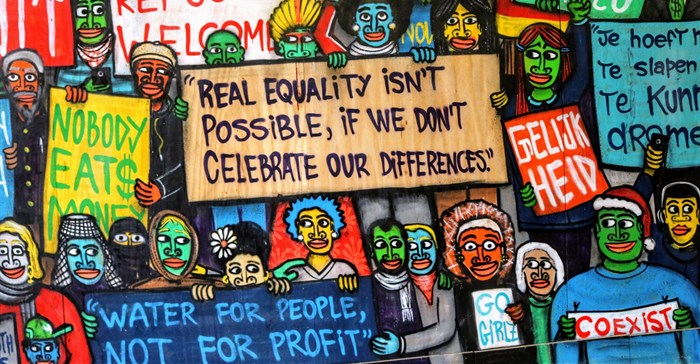
Subscribe & Follow
#AfricaMonth
Jobs
- Production Assistant Cape Town
- Brand Strategist Cape St Francis
- Brand Lead Westville
- Content Writer (Multidisciplinary Creative) Cape Town
- Multimedia Designer Sandton
In the news
Brands should step up and fill the gaps of inequality

They take to the streets, marching and protesting to effect change in their lives. Some are willing to die to change the status quo.
South Africa has the unenviable accolade of being one of the world’s most unequal societies where poverty, corruption and systemic structural decay remain the order of the day. Our citizens remain disadvantaged by poor service delivery, and the wage system keeps them trapped in a vicious cycle of debt.
What is the role of organisations in tipping the scale towards a more inclusive society? The responsibility of creating a society of wellbeing lies not only with the government as first responders. Brands are equally accountable, as they are the biggest benefactors of economic wealth.
Brands have a responsibility to look beyond their current corporate and social responsibility (CSR) programmes and should take on a bigger role in creating a more equal society. This responsibility requires a genuine desire to selflessly help solve systemic societal problems without self-serving limitations.
I call this ‘brand interventionism’ or ‘interventionist thinking’, a term synonymous with political policies.
Interventionist thinking is a willingness by a brand or corporation to get involved in solving problems that afflict citizens or customers from whom they derive profit. It is a willingness to embrace public sector partnerships to drive structural change.
This is not to say that some brands in South Africa are not playing their part. OUTsurance, for instance, stands out for their interventionist project where they placed points men to regulate traffic wherever traffic lights malfunctions.
This act of intervening in social issues and building active and mutually-beneficial relationships with citizens or customers in their lived experiences is the next strategic frontier for organisations with ambitions to live on and serve future generations. I suggest two critical shifts that, if fully embedded in all aspects of business strategies, can guide organisations and expand their societal influence.
Embrace interventionist actions as enablers of growth
In this age, where trust is distributed across an ecosystem of technology, businesses and society, a deeper consciousness between organisations and those that they serve is required. According to Stats SA, between October 2018 to December 2018, South Africans spent R11bn in bank charges and R17bn on taxi fare.
This spend has enriched banks and the taxi industry, but are they returning the favour by intervening to improve public transportation or living conditions in townships? I stand corrected, but I have not heard such.
A new social contract between brands and their consumers needs to be created. This contract should outline a clear mandate, action plans and scope of interventions a brand needs to make on an annual basis to progress people’s lives. If an organisation that has, for example, nine million customers continue to assume that sales and lifestyle gimmicks will engender them loyalty, then their playbook is outdated.
They must accept that as a leader of a large constituency, acts of interventions are not only a demonstration of doing good but a commitment to national development.
The shift must view the consumer as a benefactor contributing to shareholder value and not just as a conduit of wealth creation. I can liken this idea to the concept of shared value, but I assert that in this age, we need to move beyond creative-shared-value as it ignores the tensions between social and economic goals.
It is lived experiences that foster innovation and allow for an organisation to assume an active role in society. An interventionist mindset requires a sensibility that places people’s full context at the centre of business models. In a country like South Africa, facing critical challenges, brands have a bigger societal role to play than purely focusing on shareholder returns.
Imagine if technology and security companies partnered with the police to bring an end to gang violence that is robbing the Western Cape of children. These are the acts that our society needs to continue on a path of progress. It takes all role players to put their money where their profits are created.
A shift from social change to structural change
Over 200 years ago, Adam Smith asserted that capitalism will move up the hierarchy of consciousness and align itself to human needs and detach from superficiality. There is evidence of this taking place over the centuries, but it has been a slow burn.
One reason is that organisations got it into their heads that responding to customers’ lifestyles is more important than putting an end to shacks that rob people of their dignity. Exponential technology and micro innovations across sectors present an opportunity for organisations to align with citizens and the public sector in liberating the nation from structural impediments.
Brand differentiation and loyalty exist not only through social change but also acts of active participation in structural change. The question is whether brands can step in where the public sector fails? What prevents South Africa’s JSE-listed companies from pooling their excess funds and fix infrastructure that impedes social cohesion and productivity? Structural change is a definitive intervention that is needed not only in South Africa but across the continent.
No brand so seamlessly and unapologetically integrates social issues into their social media quite like @benandjerrys. They take positions on:
— Matthew Kobach (@mkobach) September 3, 2019
• Religious and racial prejudice
• LGBTQ equality
• Prison and criminal justice reform
• Marijuana legalization
• Climate change pic.twitter.com/WZvKrinrjR






















